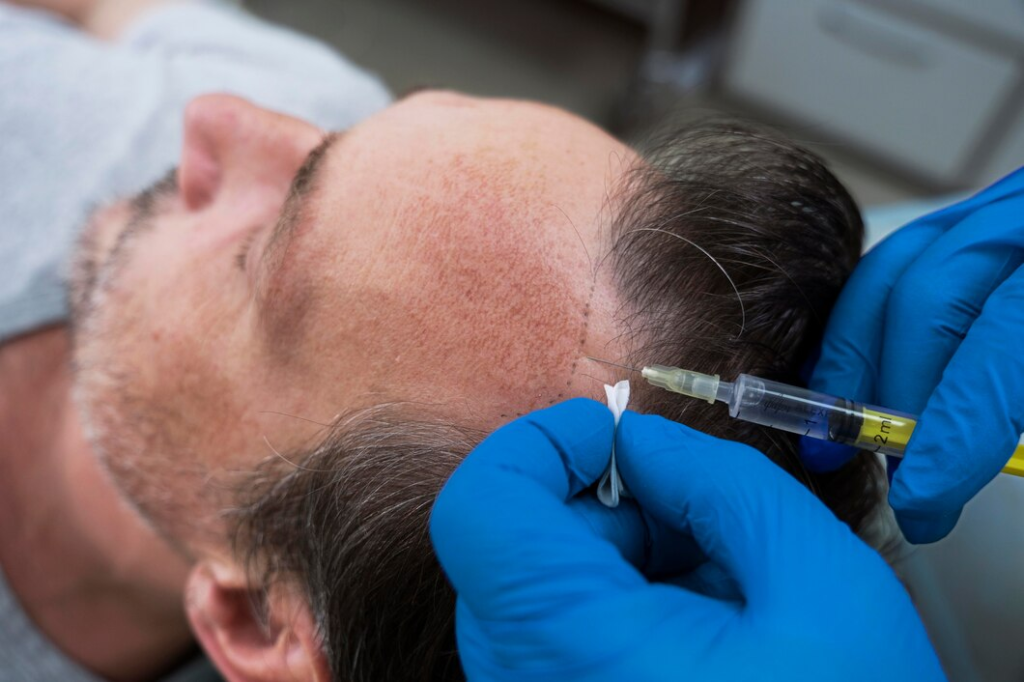Hair loss is a common concern, particularly for men, as they age. While genetics and hormonal factors play a significant role, lifestyle choices can also have a substantial impact on hair health. Understanding how your lifestyle affects hair loss can empower you to make better choices to support hair retention and growth. For those experiencing significant hair loss, treatments like men hair loss treatment options and procedures such as hair transplant surgery may provide effective solutions. This article explores the influence of lifestyle factors on hair loss and the options available to address it.
The Connection Between Lifestyle and Hair Loss
Hair is a reflection of overall health, and factors such as diet, stress, and daily habits significantly influence its condition. While genetic predisposition to male pattern baldness is unavoidable, the following lifestyle factors can exacerbate or mitigate hair loss:
Diet and Nutrition

A balanced diet is essential for healthy hair growth. Deficiencies in key nutrients like iron, zinc, vitamin D, and protein can weaken hair follicles and lead to shedding. For instance:
Iron deficiency can disrupt the oxygen supply to hair roots, causing hair thinning.
Protein deficiency deprives the hair of keratin, the primary building block.
Including nutrient-rich foods such as leafy greens, nuts, lean meats, and fish in your diet can help support healthy hair growth.
Stress Levels
Chronic stress is a leading contributor to hair loss conditions like telogen effluvium, where hair prematurely enters the shedding phase. Stress-induced hormonal imbalances, such as increased cortisol levels, can damage hair follicles and slow regrowth.
Practising stress management techniques like meditation, yoga, and regular exercise can reduce the likelihood of hair loss triggered by emotional or physical strain.
Smoking and Alcohol Consumption
Smoking reduces blood circulation to the scalp, depriving hair follicles of essential nutrients and oxygen. Similarly, excessive alcohol consumption can lead to dehydration and nutritional deficiencies, which negatively impact hair health. Quitting smoking and moderating alcohol intake are vital steps to maintaining hair vitality.
Poor Hair Care Practices
Using harsh chemicals, excessive heat styling, or tightly pulling the hair back can weaken the hair shaft and roots. Over time, these habits can contribute to breakage and hair loss. Opting for gentle hair care products and avoiding aggressive styling can prevent unnecessary damage.
Men Hair Loss Treatment Options
If lifestyle changes alone do not suffice, various men’s hair loss treatment options can address the issue effectively. These treatments aim to slow hair loss, stimulate growth, or restore lost hair:
Medications
Minoxidil
A topical treatment that stimulates hair growth and slows hair loss. It is particularly effective in the early stages of hair thinning.
Finasteride
An oral medication that inhibits the hormone DHT (dihydrotestosterone), which is often responsible for male pattern baldness.
Non-Invasive Treatments
PRP Therapy (Platelet-Rich Plasma)
This procedure involves injecting the scalp with concentrated platelets from the patient’s blood to promote hair follicle regeneration.
Laser Therapy
Low-level laser devices can stimulate hair growth by increasing blood flow to the scalp.
Advanced Surgical Options
For men experiencing severe or long-term hair loss, surgical treatments such as hair transplant surgery offer a permanent solution.
Understanding Hair Transplant Surgery

What is Hair Transplant Surgery?
Hair transplant surgery involves moving healthy hair follicles from one part of the scalp (usually the back or sides) to areas experiencing thinning or baldness. The procedure is minimally invasive and has become increasingly popular due to its natural-looking results.
Techniques Used in Hair Transplant Surgery
FUE (Follicular Unit Extraction)
Individual hair follicles are extracted and implanted into the thinning areas. This method leaves minimal scarring and offers quicker recovery.
FUT (Follicular Unit Transplantation)
A strip of skin with healthy hair follicles is removed, and individual grafts are transplanted. This technique is suitable for covering larger bald areas.
Benefits of Hair Transplant Surgery
Choosing a reputable clinic in Campbelltown for hair transplant surgery ensures:
- Access to experienced surgeons and state-of-the-art technology.
- A personalised treatment plan tailored to the patient’s hair type and loss pattern.
- Natural-looking results with minimal downtime.
Preventive Measures for Long-Term Hair Health
Even after undergoing men’s hair loss treatment or hair transplant surgery, maintaining a healthy lifestyle is critical for long-term results. Consider the following steps:
- Stick to a nutrient-rich diet to nourish new and existing hair.
- Avoid habits that can harm the scalp, such as excessive sun exposure without protection.
- Stay consistent with follow-up care and prescribed treatments, such as Minoxidil or PRP sessions, if recommended.
Conclusion
Lifestyle factors like diet, stress, and personal habits play a significant role in the health of your hair. While making positive lifestyle changes can help slow down or prevent hair loss, professional options such as men’s hair loss treatment and hair transplant surgery in Campbelltown provide additional solutions for those experiencing more advanced hair loss. By combining healthy living with expert care, you can take control of your hair health and restore your confidence.

